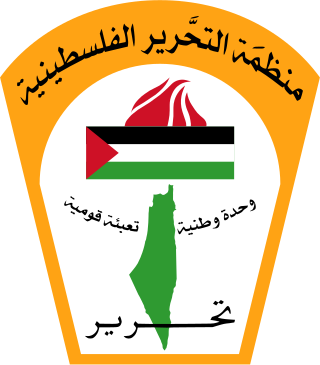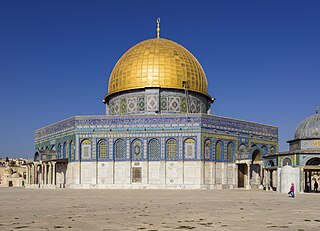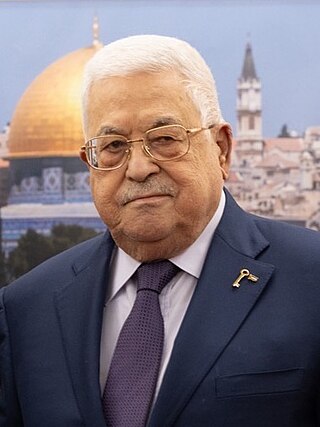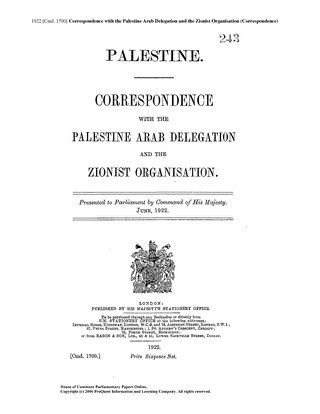
The Palestine Liberation Organization is a Palestinian nationalist coalition that is internationally recognized as the official representative of the Palestinian people in both the Palestinian territories and the diaspora. It is currently represented by the Palestinian Authority based in the West Bank city of Al-Bireh.

The Israeli–Palestinian conflict is an ongoing military and political conflict about land and self-determination within the territory of the former Mandatory Palestine. Key aspects of the conflict include the Israeli occupation of the West Bank and Gaza Strip, the status of Jerusalem, Israeli settlements, borders, security, water rights, the permit regime, Palestinian freedom of movement, and the Palestinian right of return.

The history of the State of Palestine describes the creation and evolution of the State of Palestine in the West Bank and Gaza Strip. During the British mandate period, numerous plans of partition of Palestine were proposed but without the agreement of all parties. In 1947, the United Nations Partition Plan for Palestine was voted for. The leaders of the Jewish Agency for Palestine accepted parts of the plan, while Arab leaders refused it. This triggered the 1947–1949 Palestine war and led, in 1948, to the establishment of the state of Israel on a part of Mandate Palestine as the Mandate came to an end.

Ahmad al-Shukeiri was a Palestinian political leader and the first Chairman of the Palestinian Liberation Organization, serving from 1964 to 1967.

Mahmoud Abbas, also known by the kunya Abu Mazen, is a Palestinian politician who is the president of the State of Palestine and the Palestinian National Authority (PNA). He has been the chairman of the Palestine Liberation Organization (PLO) since 2004, PNA president since January 2005, and State of Palestine president since May 2005. Abbas is also a member of the Fatah party and was elected chairman in 2009.

The Churchill White Paper of 3 June 1922 was drafted at the request of Winston Churchill, then Secretary of State for the Colonies, partly in response to the 1921 Jaffa Riots. The official name of the document was Palestine: Correspondence with the Palestine Arab Delegation and the Zionist Organisation. The white paper was made up of nine documents and "Churchill's memorandum" was an enclosure to document number 5. While maintaining Britain's commitment to the Balfour Declaration and its promise of a Jewish national home in Mandatory Palestine, the paper emphasized that the establishment of a national home would not impose a Jewish nationality on the Arab inhabitants of Palestine. To reduce tensions between the Arabs and Jews in Palestine the paper called for a limitation of Jewish immigration to the economic capacity of the country to absorb new arrivals. This limitation was considered a great setback to many in the Zionist movement, though it acknowledged that the Jews should be able to increase their numbers through immigration rather than sufferance.
Mahmoud Ahmadinejad was President of Iran from 3 August 2005 to 3 August 2013, and during that time had repeatedly made contentious speeches and statements against Israel. Ahmadinejad refused to call Israel by name, instead calling it the “Zionist regime”. He has called for the "elimination of the Zionist regime". Ahmadinejad took part in a protest called "The World Without Zionism" and has derided Israel on numerous occasions. He has urged regional powers to cut diplomatic and economic ties with Israel and halt oil sales. Tensions have risen over Iran's nuclear program. He has also provided funding, training and arms to Hezbollah and Hamas.

Rashid Ismail Khalidi is a Palestinian-American historian of the Middle East and the Edward Said Professor Emeritus of Modern Arab Studies at Columbia University. He served as editor of the Journal of Palestine Studies from 2002 until 2020, when he became co-editor with Sherene Seikaly.

The Islamic Republic of Iran officially recognises Palestine as a state. Ali Khamenei, the Supreme Leader of Iran, rejects a two-state solution and implies that Palestine is inseparable, while Iran's former President Mahmoud Ahmadinejad called for a free referendum for the entire Palestinian population, including Arab citizens of Israel, to determine the type of government in the future Palestinian State, while reiterating that establishment of a Palestinian State alongside Israel would "never mean an endorsement of the Israeli occupation".

India–Palestine relations, also known as Indian-Palestinian relations or Indo-Palestinian relations, are the bilateral relations between the Republic of India and the State of Palestine. These relations have been largely influenced by the independence struggle against British colonialism. India recognized Palestine's statehood following the Palestinian declaration of independence on 18 November 1988; although relations between India and the Palestine Liberation Organization were first established in 1974.

The Holy See and Palestine established formal diplomatic relations in 2015 through the mutual signing of the Comprehensive Agreement between the Holy See and the State of Palestine. In 2017, a Palestinian embassy to the Holy See was opened.

Direct negotiations between Israel and the Palestinian National Authority took place throughout 2010 as part of the peace process, between United States President Barack Obama, Israeli Prime Minister Benjamin Netanyahu, and Palestinian Authority Chairman Mahmoud Abbas. The ultimate aim of the direct negotiations is reaching an official "final status settlement" to the Israeli–Palestinian conflict by implementing a two-state solution, with Israel remaining a Jewish state, and the establishment of a state for the Palestinian people.

Political relations between the State of Palestine and the United States have been complex and strained since the 1960s. While the U.S. does not recognize the State of Palestine, it recognizes the Palestine Liberation Organization (PLO) as the legitimate representative entity for the Palestinian people; following the Oslo Accords, it recognized the Palestinian National Authority as the legitimate Palestinian government of the Palestinian territories.

Egypt–Palestine relations are the bilateral relations between the Arab Republic of Egypt and the State of Palestine. Egyptian President Gamal Abdel Nasser was a strong supporter of the Palestinian cause and he favored self-determination for the Palestinians. Although the Egyptian government has maintained a good relationship with Israel since the Camp David Accords, most Egyptians strongly resent Israel, and disapprove of the close relationship between the Israeli and Egyptian governments.

Relations between the European Union and the Palestine Liberation Organisation (PLO) were established in 1975 as part of the Euro-Arab Dialogue. The EU is a member of the Quartet and is the single largest donor of foreign aid to the Palestinian Authority.
United Nations General Assembly resolution 67/19 was a resolution accepting Palestine as a non-member observer state in the United Nations General Assembly. It was adopted by the sixty-seventh session of the United Nations General Assembly on 29 November 2012, the date of the International Day of Solidarity with the Palestinian People and the 65th anniversary of the adoption by the General Assembly of resolution 181(II) on the Future Government of Palestine. The draft resolution was proposed by Palestine's representative at the United Nations. It, however, maintains the status of the Palestinian Liberation Organization as the representative of the Palestinian people within the United Nations system. Though strongly contested by the United States and the government of Israel, former Israeli Prime Minister Ehud Olmert expressed support for the measure. The motion was seen as largely symbolic, though it could allow Palestine to start proceedings at the International Criminal Court against Israel. Its timing, following a year in which Palestine obtained membership of UNESCO and the UN Security Council was unable "to make a unanimous recommendation" on their application for full UN membership, and coming several days after the completion of Operation Pillar of Defense, was also noted. The new status equates Palestine with that of the Holy See within the United Nations system and implicitly recognises Palestinian sovereignty.
The 2013–2014 Israeli–Palestinian peace talks were part of the Israeli–Palestinian peace process. Direct negotiations between Israel and the Palestinians began on 29 July 2013 following an attempt by United States Secretary of State John Kerry to restart the peace process.
The Palestine Liberation Organization (PLO) declared the establishment of the State of Palestine on November 15, 1988. As of June 2024, the State of Palestine is recognized as a sovereign state by 145 of the 193 member states of the United Nations. It is a non-member observer state at the United Nations since November 2012. This limited status is largely due to the United States, a permanent member of the Security Council with veto power, has consistently used its veto or threatened to do so to block Palestine’s full membership to UN. The existence of a state of Palestine is recognized by the states that have established bilateral diplomatic relations with it. There is a wide range of views on the legal status of the State of Palestine, both among international states and legal scholars.

Husam Said Zomlot is a Palestinian diplomat, academic and economist. He was appointed Head of the Palestinian Mission to the United Kingdom in October 2018. Before his posting to the UK, he served as head of the PLO mission to the United States that was closed by President Donald Trump's administration.















